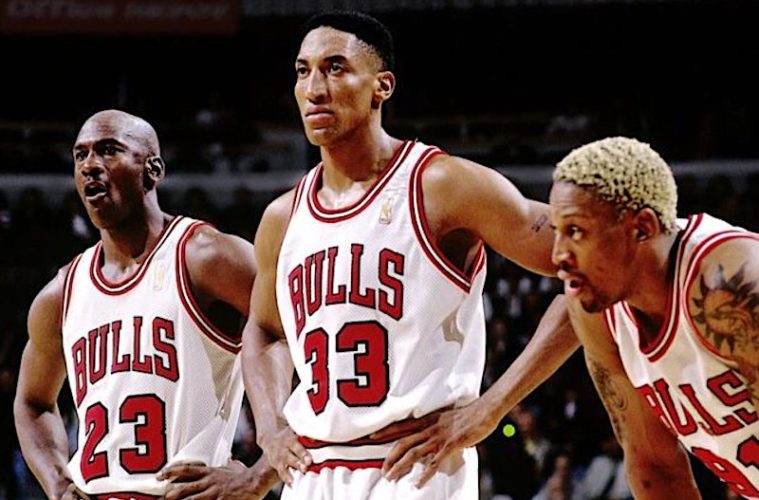For some, the unfurling of the epic 10-part documentary series unpacking Michael Jordan and the Chicago Bulls’ NBA championship season in 1997-98 has been something akin to a religious experience. And by some, we mean the millions and millions who made it the most-watched not-a-game program in ESPN history. For others, it’s been received as a melodramatic, hastily finished, possibly too lengthy brand exercise on the part of the network and the star himself — who presciently not only invited in the camera crews back in the day, but retained total rights to the footage and power over this new production. The truth is, it is all those things.
The Last Dance is a bit ragged in places, the timeline structure is whiplash-inducing, and we already know how it ends. But for any worshiper at the church of basketball and/or the altar of Jordan, it is an emotionally engaging replacement for the loss of this year’s NBA postseason, during which its original release had been scheduled. Moving up the release date was a gift to sports fans in lockdown sorely lamenting the postseason cancellation, and in that sense alone, the huge amount of game footage from all six of the Bulls’ championship series scratches the itch. No matter what you think you remember about how good Jordan was, watching hundreds of clips from his decade of scorching highlight reels continues to be thrilling.
One point the documentary makes with oomph is that Jordan the player deserved every single athletic accolade that came his way, and that he worked at a Herculean level with superhuman discipline and focus to earn the wins. At the same time, through the film’s interviews with around 100 people — teammates, opponents, coaches, owners, journalists, friends and family — who were there before, during and after Jordan’s rise, wobble, comeback, repeat scenarios, there were steep prices to be paid for this level of single-minded focus. Though in a position to squash content he might have wanted to omit, Jordan “allows” a remarkable amount of criticism and critique to enter the narrative, often in the form of teammates setting the record straight on notable, even scandalous episodes from the past.
That’s where the timeline structure is both genius and byzantine. If you graphed it out, you’d draw a straight line labeled 1997-98 season; that’s the alpha and omega of the narrative. But along the way, through 10 hours of shows, you’d draw spikes off that year which explore in deep dives both topics (the role of family, rumored gambling problems, palace intrigue in the Bulls back office, the love/hate relationship with local and national media, the commercial profit racket, his relationship with his father who was tragically killed) and characters (his parents, individual managers’, writers’ and players’ backstories and their unique perspectives on specific events and dynamics, and their personal experience with Jordan himself). Oh yeah, I remember when Dennis Rodman dated Madonna! Oh right, Scotty Pippen did go on personal strike that season, that was crazy! Wow, I almost forgot when Jordan played baseball! It’s compelling, but at the same time, there’s a certain feeling of seasickness that comes with all darting around across timelines. Wait, is it 1993 or 1996? Oh it’s 1989, okay.
The interviews are by turns hilarious, gasp-inducing and jaw-dropping; some are quite emotional and the times Jordan has cried on camera have gotten a lot of attention. But it’s a genuine pleasure to see the pageant of legendary players in the present day, and to watch them remembering and contextualizing the events that shaped their own lives and careers. They speak about themselves as well as about Jordan, and whether it’s organic or a testament to the direction and editing, their stories all hang together and impress with their frankness and honesty — even or especially Jordan’s own. It’s hard to know if the ownership he displays of his own faults is profound self-awareness or (more likely) just warts-and-all self-acceptance, but he seems to really understand both what he achieved and what it cost him. As we head into this Sunday’s broadcast of the final two episodes it’s worth asking if maybe (other than the Bulls’ season win) we don’t fully know how it ends at all.
For its part, Twitter has been outdoing itself with the global watch party, weighing in with a universe of memes and clapbacks; it even briefly made #cocainecircus trend back on the debut weekend. And the music is incredible, maybe the best part. The choice was made to keep it contemporaneous and iconic to the years the series revisits, and there’s a sort of song-based memory-trigger that helps drop you right back into the day. In fact it’s so good, they made a Spotify playlist which you’ll love even if you don’t like basketball. In the end the same can be said about The Last Dance. Not a sports fan? Well you didn’t know anything about tigers or cheerleading either, did you? And the whole point of this binge-worthy show is to remember that sometimes, like for example right now, sports is about more than just the game.
The final episodes air Sunday night on ESPN.
Advertising disclosure: We may receive compensation for some of the links in our stories. Thank you for supporting LA Weekly and our advertisers.

